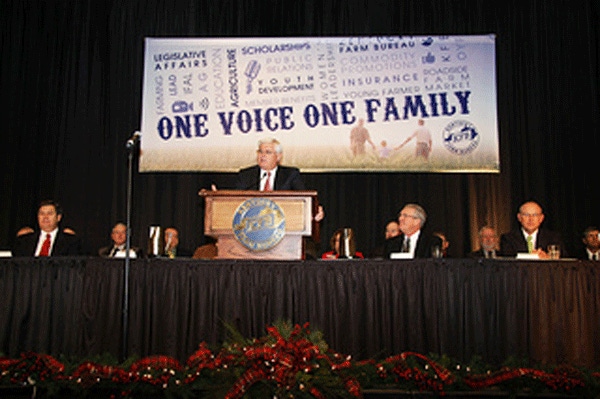
Kentucky Farm Bureau addresses ag water concerns
• Farm Bureau strongly supported the 1994 legislation that created guidelines and a cost-share program to help farmers protect water quality. • Under the program farmers are required to have state-approved plans to comply with accepted agricultural practices.
December 14, 2012

Protecting the quality of water resources and having access to an adequate supply of water for agriculture production are emerging as critical issues for Kentucky farmers, Kentucky Farm Bureau President Mark Haney said in a keynote address at the organization’s 93rd annual meeting.
Haney, a Pulaski County farmer completing his fourth year as president of the state’s largest farm organization, said mounting concerns about agriculture’s effect on waterways should prompt farmers to re-examine their operation to ensure compliance with Kentucky’s landmark Ag Water Quality Law.
Farm Bureau strongly supported the 1994 legislation that created guidelines and a cost-share program to help farmers protect water quality. Under the program farmers are required to have state-approved plans to comply with accepted agricultural practices.
“That program has been enormously successful, but we need to stay current,” Haney said. “I urge producers to review their plan and take steps, if necessary.”
Access to water looms as an obstacle to farming in Kentucky, said Haney.
“Through the years we’ve been asked to produce more from less land while being as efficient as possible,” Haney said. “To accomplish that we will need to utilize more water at appropriate periods. We need policies to determine how agriculture can gain access to water supplies. This is particularly crucial in western Kentucky, with our larger row crop farms.”
While touching on a wide range of issues facing KFB in the year ahead, Haney noted that he has had the good fortune of heading the organization during a period of relative prosperity for Kentucky agriculture.
Beyond the industry’s economic factors for strong commodity markets, credit also should go to Kentucky’s historic agricultural development initiative utilizing tobacco settlement funds, he said.
“We should be thankful that our legislature had the foresight and commitment to put this program in place,” Haney said in reference to legislation enacted in 2001.
“These investments have advanced our infrastructure – as well as marketing and promotional initiatives — to provide producers with better resources to succeed in the marketplace.”
Despite’s tobacco’s downturn, farm cash receipts in Kentucky have risen dramatically over the past decade, approaching the $5 billion mark.
With nearly 500,000 member families statewide, Kentucky Farm Bureau is the state’s largest general farm organization. Approximately 1,700 members attended KFB’s 93rd annual meeting to recognize this year’s individual and organizational achievements as well as adopt policy for 2013.
You May Also Like



